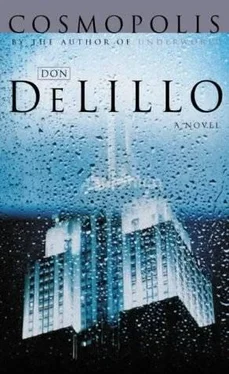Don Delillo - Cosmopolis
Здесь есть возможность читать онлайн «Don Delillo - Cosmopolis» весь текст электронной книги совершенно бесплатно (целиком полную версию без сокращений). В некоторых случаях можно слушать аудио, скачать через торрент в формате fb2 и присутствует краткое содержание. Жанр: Современная проза, на английском языке. Описание произведения, (предисловие) а так же отзывы посетителей доступны на портале библиотеки ЛибКат.
- Название:Cosmopolis
- Автор:
- Жанр:
- Год:неизвестен
- ISBN:нет данных
- Рейтинг книги:5 / 5. Голосов: 1
-
Избранное:Добавить в избранное
- Отзывы:
-
Ваша оценка:
Cosmopolis: краткое содержание, описание и аннотация
Предлагаем к чтению аннотацию, описание, краткое содержание или предисловие (зависит от того, что написал сам автор книги «Cosmopolis»). Если вы не нашли необходимую информацию о книге — напишите в комментариях, мы постараемся отыскать её.
DeLillo skates through a day in the life of a brilliant and precocious New Economy billionaire in this monotone 13th novel, a study in big money and affectlessness. As one character remarks, 28-year-old Eric Packer "wants to be one civilization ahead of this one." But on an April day in the year 2000, Eric's fortune and life fall apart. The story tracks him as he traverses Manhattan in his stretch limo. His goal: a haircut at Anthony's, his father's old barber. But on this day his driver has to navigate a presidential visit, an attack by anarchists and a rapper's funeral. Meanwhile, the yen is mounting, destroying Eric's bet against it. The catastrophe liberates Eric's destructive instinct-he shoots another character and increases his bet. Mostly, the action consists of sequences in the back of the limo (where he stages meetings with his doctor, various corporate officers and a New Economy guru) interrupted by various pit stops. He lunches with his wife of 22 days, Elise Shifrin. He has sex with two women, his art consultant and a bodyguard. He is hit in the face with a pie by a protester. He knows he is being stalked, and the novel stages a final convergence between the ex-tycoon and his stalker. DeLillo practically invented the predominant vernacular of the late '90s (the irony, the close reading of consumer goods, the mock complexity of technobabble) in White Noise, but he seems surprisingly disengaged here. His spotlighted New Economy icon, Eric, doesn't work, either as a genius financier (he is all about gadgetry, not exchange-there's no love of the deal in his "frozen heart") or a thinker. The threats posed by the contingencies that he faces cannot lever him out of his recalcitrant one-dimensionality. DeLillo is surely an American master, but this time out, he is doodling.
From Library Journal
Unlike his sprawling masterpiece, Underworld, DeLillo's 13th novel is short and tightly focused, indeed almost claustrophobic. Most of the action takes place inside a "prousted" (cork-lined) stretch limo, as the reclusive financial wizard Eric Packer is chauffeured across Manhattan for a haircut. Thanks to a presidential visit, antiglobalization demonstrations, and a celebrity funeral, this journey takes up most of the day. Stuck in traffic, Packer anxiously monitors the value of the yen on the limo's computer. Using the car as his office, he summons advisors from nearby shops and restaurants. His physician gives him a rubber-gloved physical exam in the back seat as Packer discusses imminent financial ruin with his broker and angry crowds block the streets. This work most closely resembles The Body Artist in its brevity and straightforward narrative flow. However, the earlier novel was written in an uncharacteristically warm, poetic style, promising a new direction for this important writer, while Cosmopolis reverts to the standard DeLillo boilerplate, perceptive and funny but also brittle and cold. This, coupled with the book's dated 1990s sensibility, makes Cosmopolis a step backward rather than an artistic advance.













